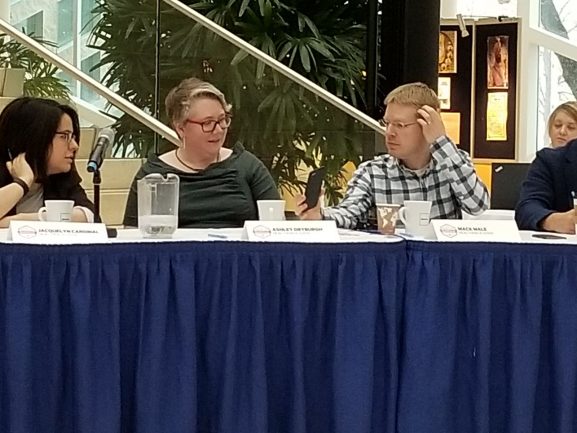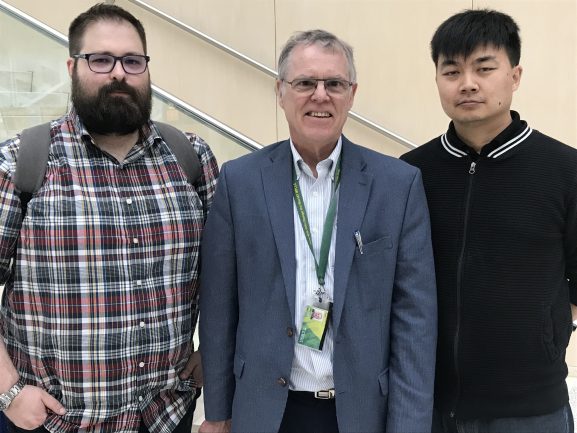HealthHack competition helps Edmonton become a smarter city
By Nick Petlock on April 23, 2018
Consider a city where wheelchair users can access everywhere anyone else can. Kenton Hamaluik, Musi Ala and Martin Ferguson-Pell hope Edmonton will be that city one day.
Ferguson-Pell and his team took home first place at the HealthHack competition on Monday, after pitching their “Redliner Goes to Town” idea to the judges. The purpose of the HealthHack Competition is to encourage smart city solutions to improve the health of Edmontonians.
Ferguson-Pell and his team’s idea is to use sensors on wheelchairs to help map out places in Edmonton that are easily accessible to wheelchair users.
“As the wheel rotates we’re generating force information. In fact what we’re really generating is acceleration information. This can give us an indication of both how much force Musi is putting in when he is pushing, but also how much he decelerates after that push,” says Martin Ferguson-Pell, Lab Director of the team.
The judges were quite surprised by the instant transfer of information from the wheelchair to the phone app they were looking at.

Judges watching information from the tracker on the wheelchair being transferred to the app instantly.
“The idea is that the company would actually contract in order to get these kind of assessments done, and then make it available to all comers on the website as an open source of information,” says Ferguson-Pell.
He hopes that one day Edmonton will be a smart city people look up to. Being an accessible city is a step towards that.
According to the Rick Hansen Foundation, the 2017 Accessible Cities Awards were given to:
-
- Winnipeg, MB
- Richmond, BC
- Edmonton, AB
However, Ferguson-Pell believes further improvements could be made.
“I’d like people to look at the City of Edmonton website, see this kind of information and see Edmonton as one of the smartest go-ahead cities, when it comes to disability access in North America.”
Although Redliner is meant to be contracted out to create the mapping, the team wants to explore having it available to the average wheelchair user, to share their day-to-day data.
“Our group developed that as well. That’s developed with a kind of activity tracker, but for manual wheelchair users. So that would definitely be something that can be thrown onto anybody’s chair and used day-t0-day,” says Kenton Hamaluik, developer of the Redliner app.
Ferguson-Pell’s team took home 5,000 dollars for winning the HealthHack competition on Monday.

(left to right) Mapping and App Designer, Kenton Hamaluik, Lab Director, Martin Ferguson-Pell and Live Chart and App Designer, Musi Ala
Other teams that were up against Ferguson-Pell include:
-
-
- Bravely Bringing Buddy Benches Beyond – Near-field communication (NFC) tags placed at public locations, allowing the user to see a virtual message board of people who have been there in the past.
- Trailblazing Twitter – The use of Twitter data to improve the mental health of Edmontonians.
- Blockchain-based Ecosystem for Informed Cannabis Consumption – Getting cannabis users to take surveys to collect data about cannabis consumption. In exchange, the user receives digital tokens.
- Becoming Active? Supporting the Non-Athlete in All of Us – Provides evidence-based strategies to live a better lifestyle. Specifically targeting the less active 85% of the population.
-
Second place winners Joe Dang and Reed Sutton for the cannabis ecosystem idea took home $2,500. Third place winners Dr. PJ Rawlek, K. DeZutter, N.Twal, C. Nicole, E. Barbaric and B. Poetz for Fitness App for Non-Athletes took home $1,000.
Soumya Ghosh, Director of Digital Enablement at the City of Edmonton, says the purpose of the HealthHack competition is to “reach out to the community to get their thoughts and processes, and innovativeness,” involved in the Smart City program.
Ghosh wants to use these ideas to have Edmonton one day be a smart city leader.
“That’s kind of the vision and end goal right? And the path we take will probably vary from other cities or municipalities or countries, but here that’s definitely the future that we as a team envision.”
